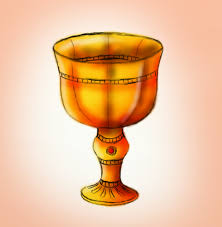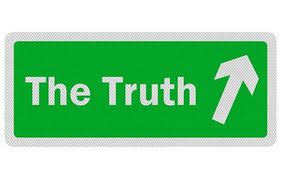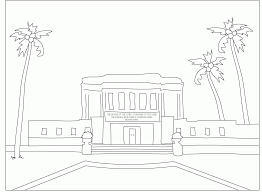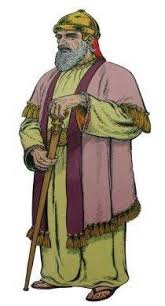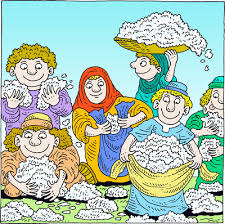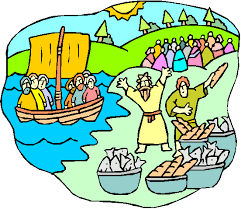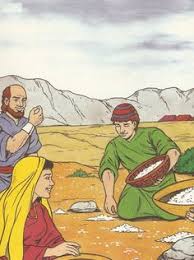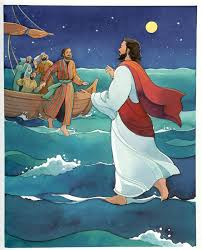John 8:12 – Again Jesus spoke to them, saying, "I am the light of the world. Whoever follows me will not walk in darkness, but will have the light of life."
Jesus just finished dealing with the woman caught in adultery. He quickly and completely shut down the plan of the Pharisees to ensnare him in a controversy that could have potentially ended his ministry and/or his life.
 At the same time, he shows the mercy of God to the woman who deserved death (according to the law). He forgives her sin and sends her on her way with the command to sin no more.
At the same time, he shows the mercy of God to the woman who deserved death (according to the law). He forgives her sin and sends her on her way with the command to sin no more. This shows that Jesus doesn't just teach with words; he teaches by example. This is one of the attributes that makes him a good leader. Anyone can talk about forgiveness or mercy, but Jesus shows us how to shower these blessings on a confused and desperate world.
To start with, we note that Jesus did not immediately condemn this woman, even though she was guilty of sin. He did not embarrass her in front of the crowd, nor did he pound his fist on the ground and tell her she was going to hell.
Why is that? For one thing, those who are caught in the web of Satan have an immediate need for mercy/grace, not judgment.
Mark 2:16-17 - And when the scribes and Pharisees saw him eat with tax collectors and sinners, they said unto his disciples, How is it that he eats and drinks with tax collectors and sinners? When Jesus heard it, he said unto them, They that are whole have no need of the physician, but they that are sick: I came not to call the righteous, but sinners to repentance.
Many Christians, perhaps unwittingly, decide which sins they will accept in other people and which sins they will not. For example, there are Christians who are willing to forgive people who have an addiction to alcohol, but they immediately condemn and dismiss a person who is addicted to drugs. Some Christians are willing to support women and men involved in an adulterous relationship, but they turn their backs on people who are confused about their gender.
In God's eyes, sin is sin. ALL those who are caught in Satan's snare are in need of God's love. When dealing with the lost, we should follow the example of Jesus as he dealt with the woman caught in adultery – he demonstrated the love and grace of God without affirming her sin or life choices.
This is a powerful key in relating to the lost. Most of them are expecting judgment from you, so when you show mercy it tells them something is 'different' about you. This opens the door for you to share the gospel message.
Once Jesus had shown her the mercy of God, then he privately addressed the issue of her sin. For us, it is best to establish a solid relationship with the lost before we approach the topic of their sin.
Jesus then reaffirms that he is the light of the world. As we discussed in John chapter 1, nothing on earth would survive without the light of the sun. The same is true in the spiritual realm – none of us could live spiritually without the Son. It is our privilege to give the world a glimpse of spiritual life in Christ.
Here is something interesting to consider: Although the woman in John chapter 8 saw the light of Christ while in the temple, that is NOT true for most people, because the vast majority of sinners aren't attending church. For most of them the only glimpse of Jesus they will get is the one they see in you.
Let me repeat that: For most sinners, the only glimpse of Jesus they will get is the one they see in you.
Therefore, it is imperative that the light of Christ is shining brightly in our own lives (Matthew 5:16). It is essential that we offer his love and grace to the lost. Jesus has done his part – he shed his blood so we could be set free from sin. Now we need to do our part and show that grace to those who need it most.
John 8:13 – So the Pharisees said to him, "You are bearing witness about yourself; your testimony is not true."
When Jesus declares to the religious leaders that he is the light of the world, they immediately oppose him.
As we have discussed in earlier studies, the Law required two witnesses for a testimony to be accepted as true. Since Jesus is testifying about himself, the Pharisees reject his testimony as false.
However, they are spiritually blind. All Jews believed that only God could work miracles. Since Jesus was working miracles by the hundreds, God was surely confirming that Jesus was the Messiah.
John 8:14 – Jesus answered, "Even if I do bear witness about myself, my testimony is true, for I know where I came from and where I am going, but you do not know where I come from or where I am going."
Jesus responds by basically saying he is an exception to this rule.
The law demanded two witnesses because men are sinful and they often speak from a spirit of pride or falsehood. In other words, human beings will lie or deceive to gain an advantage or to make themselves look good. But Jesus is not a mere man. As the divine Son of God, he never promotes himself or his own agenda. He says and does only what the Father has commanded him. Therefore, this law doesn't really apply to him (John 5:30-32).
Furthermore, Jesus points out that his testimony is true because he fully knows and understands that he came from heaven at the command of God. He also fully knows and understands that after he has been crucified and resurrected (completed his mission) he will once again return to heaven to sit at the right hand of the Father.
No other man on earth could possibly confirm these facts, because no one on earth had seen or witnessed Jesus as he lived in Heaven with Father God and Holy Spirit. Consequently, none of them were qualified to pass judge the testimony of Jesus.
John 8:15-16 – "You judge according to the flesh; I judge no one. Yet even if I do judge, my judgment is true, for it is not I alone who judge, but I and the Father who sent me."
There are two ways to perform judgment – by the flesh or by the Spirit.
To judge according to the flesh is to judge according to appearances, preconceived opinions and/or prejudices. This was exactly how the religious leaders judged Jesus.
For example, the Jews believed that the Messiah would come as a conquering hero, who would immediately defeat their enemies and set up a kingdom that rivaled the 'golden age' of Israel under David and Solomon. As such, he would obviously be rich and powerful. Because Jesus did not fit their preconceived ideas, they rejected him as Messiah. They judged according to the flesh.
We know that when Jesus came to earth as our redeemer, he did not come to judge/condemn the world, but to save it. Yet even if he did (and he one day will), his judgment would be fair, true and impartial because he judges by the Spirit. To judge with the guidance of Holy Spirit is to judge righteously (Psalms 72:2) – according to the facts and the motivations of a man's heart:
1 Samuel 16:7 - But the LORD said unto Samuel, Look not on his countenance, or on the height of his stature; because I have refused him: for the LORD sees not as man sees; for man looks on the outward appearance, but the LORD looks on the heart.
Unlike the Pharisees, Jesus has the right and authority to pass judgment because he is no ordinary man. He is the divine Son of God, sent by the Father. Since he and his Father are in complete agreement, their testimony/judgment is true (two witnesses).
John 8:17-18 – "In your Law it is written that the testimony of two people is true. I am the one who bears witness about myself, and the Father who sent me bears witness about me."
Once again Jesus shows that he has come to fulfill the law, not to abolish it. There are indeed two persons who agree about his testimony – he and his Father.
As he mentioned earlier, Jesus' testimony of himself is credible/true because he knows where he came from (heaven) and where he is going (into the presence of the Father and Spirit). No man on earth could confirm this testimony, but that's okay; it is accredited by a much higher source – Father God.
The Father had indeed testified to the divinity of Jesus in several ways including audibly at his baptism (Matthew 3:17), through fulfillment of Old Testament prophesy (Zechariah 9:9, Micah 5:2, etc) and through the performance of miracles.
The same is true for any judgment Jesus makes – it would not be an individual judgment but the judgment of two witnesses because he and the Father are in agreement on all things. This was discussed at length in our study of John chapter 5.
John 8:19 – They said to him therefore, "Where is your Father?" Jesus answered, "You know neither me nor my Father. If you knew me, you would know my Father also."
There can be no doubt that the Pharisees asked this question in a spirit of mockery and spite, because they were well aware that Jesus was referring to God when he spoke of his Father. We can even picture them pretending to look around for Joseph as they asked it.
By ridiculing Jesus, they have also mocked and rejected the very God they claim to serve. If you were Jesus, how would you deal with these people? Perhaps your reaction would be similar to mine – I would probably call fire down from heave to consume them!
But Jesus does not allow them to stir up his anger. Instead, he ignored their contempt and gave them a righteous response – if they will listen to his instruction, and receive him as the Messiah, then they will know his Father.
The fact is, no man can approach God unless the Messiah (Jesus) makes a way for him through his blood. Consequently, anyone who rejects Jesus has rejected their only path/avenue to find God. The Pharisees did not seem to grasp this concept, no matter how many times Jesus taught it to them!
Once again, we find Jesus teaching us by example. Do we respond righteously when we are mocked or ridiculed for our faith? We are definitely called to do so:
2 Timothy 2:24-26 - And the servant of the Lord must not strive; but be gentle unto all men, apt to teach, patient, in meekness instructing those that oppose them; if God perhaps will give them repentance to the acknowledging of the truth; and that they may recover themselves out of the snare of the devil, who are taken captive by him at his will.
The apostle Paul admonishes us to respond righteously, as Christ did. We are to consider the lost as captives of the devil, snared by his evil schemes. We are to have compassion for them as a shepherd has compassion for a lost sheep.
Paul cautions us not to strive with them, but to answer them gently and patiently so they can escape the deadly snare of the enemy. If Jesus can ignore the taunts of his enemies, can't we do the same?
John 8:20 – These words he spoke in the treasury, as he taught in the temple; but no one arrested him, because his hour had not yet come.
The treasury was a part of the temple where the sacred offerings were collected. It was within the court of the women. Scholars tell us it held 13 chests or collection boxes – one for each tribe and one that only women were permitted to use for offerings. It was a much frequented place; we can safely infer that the confrontation between Jesus and the Pharisees was witnessed by a large group of Jews. But strangely, the religious leaders did nothing to stop Jesus.
Think about what a remarkable miracle this really is. The religious leaders held immense power and influence in the Jewish nation, especially in the temple. They had the authority to permanently banish people from the temple with a single command (John 9:22). Yet, we find Jesus constantly teaching in the temple and they do nothing to stop him! Furthermore, they had already decided to kill him, but he continues to teach while they stand by and allow him to speak!
Clearly, God protected Jesus and restrained Satan so that mankind could hear the gospel message. Eventually, Jesus would die for us, but only at the time appointed by God.
Let me offer you some encouragement and relief:
God had an appointed time for Jesus to finish his ministry by dying on the cross and then rising again. If you think about it, the same is true for you and me. God numbered the days of our earthly existence before we were ever born (Psalms 139:16). He established a plan/purpose for our lives, just as he did with Jesus.
So let me give you some encouragement and relief – Satan may hate you, but he cannot cut your life short unless God allows it. Stay close to God, and let your light shine for Christ. He will make sure you are able to complete all the good works God ordained for you to do.
Let me offer you some strength:
The religious leaders mocked and taunted Jesus, but he never allowed them to bait him into an angry response. Instead, he answered them righteously and revealed the truth of the gospel to them.
We need to follow the example of Christ in this area. The first step in this process is seeking the help of Holy Spirit, who can give us the strength and wisdom to avoid these traps.






